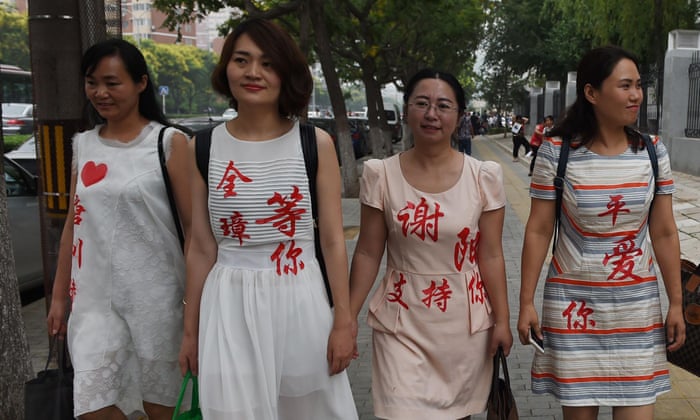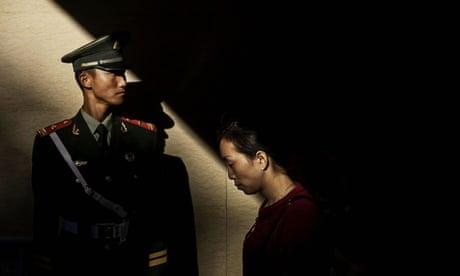By Tom Phillips in Beijing

Chen Guiqiu (3rd L), the wife of detained human rights lawyer Xie Yang, with other wives of detained human rights lawyers wearing the names of their husbands on their dresses in 2016.
The wives of some of the most prominent victims of Xi Jinping’s crackdown on civil society have stepped up their campaign for justice, backing calls for US sanctions against Chinese officials involved in barbaric cases of torture and abuse.
Addressing a congressional hearing in Washington on Thursday, the women, whose husbands were among the key targets of a Communist party offensive against human rights lawyers, detailed the physical and psychological trauma inflicted by China’s war on law.

Chen Guiqiu, who fled to the United States in March, told of how her husband, the attorney Xie Yang, had been imprisoned and brutally tortured because of his work defending victims of land grabs, religious persecution and dissidents.
She described her husband’s ordeal as an example of China’s lawlessness and claimed that at his recent trial Xie had been forced to refute detailed claims that he had been the victim of sustained and brutal campaign of torture.
Wang Yanfeng, the wife of Tang Jingling, a lawyer and democracy activist who was jailed in 2016 in what campaigners described as “a gross injustice”, said her husband had suffered repeated spells of abuse, threats and torture.
Wang Yanfeng, the wife of Tang Jingling, a lawyer and democracy activist who was jailed in 2016 in what campaigners described as “a gross injustice”, said her husband had suffered repeated spells of abuse, threats and torture.
“Today other [lawyers and political prisoners] are still suffering from such torture,” Wang said, calling on Donald Trump to challenge China over such abuses.
In a video message, Li Wenzu, the wife of lawyer Wang Quanzhang, said she had heard nothing from him since he was seized by police at the start of the campaign against lawyers in July 2015.
In a video message, Li Wenzu, the wife of lawyer Wang Quanzhang, said she had heard nothing from him since he was seized by police at the start of the campaign against lawyers in July 2015.
“I am deeply concerned about my husband’s safety. I don’t know how his health is. I don’t know whether he has been left disabled by the torture. I don’t even know whether he is alive.”
Wang Qiaoling, whose husband, Li Heping, recently emerged from a 22-month stint in custody, said he returned home looking “20 years older” and had told of being forced to sit for hours in stress positions and being shackled with chains.
Wang Qiaoling, whose husband, Li Heping, recently emerged from a 22-month stint in custody, said he returned home looking “20 years older” and had told of being forced to sit for hours in stress positions and being shackled with chains.
“He suffered from very cruel and sick torture,” Wang added.
Also giving testimony was Lee Chin-yu, whose husband, the Taiwanese human rights activist Lee Ming-che, vanished into Chinese custody in March after travelling to the mainland.
Also giving testimony was Lee Chin-yu, whose husband, the Taiwanese human rights activist Lee Ming-che, vanished into Chinese custody in March after travelling to the mainland.
“I stand alone before you today to plead for your help for my husband,” Lee said, calling on Washington to pressure China to end her husband’s “illegitimate detention”.
Since China’s crackdown on lawyers began almost two years ago, its victims’ wives have emerged as a relentless and forceful voice of opposition, often using humorous online videos and public performances to champion their cause.
Since China’s crackdown on lawyers began almost two years ago, its victims’ wives have emerged as a relentless and forceful voice of opposition, often using humorous online videos and public performances to champion their cause.
They say they have done so in defiance of a campaign of state-sponsored intimidation that has seen them trailed by undercover agents, struggle to enrol their children into schools or be evicted from their homes.
Terry Halliday, the author of a book about China’s human rights lawyers, said the lawyers’ wives had opened up “a new line of struggle that we have not seen before in China”.
“These women have become a very powerful and visible public presence both of criticism of the government, of appeals for the release of their loved-ones but also impugning China in the eyes of the world. It is remarkable.”
“It’s a whole new front,” Halliday added.
Terry Halliday, the author of a book about China’s human rights lawyers, said the lawyers’ wives had opened up “a new line of struggle that we have not seen before in China”.
“These women have become a very powerful and visible public presence both of criticism of the government, of appeals for the release of their loved-ones but also impugning China in the eyes of the world. It is remarkable.”
“It’s a whole new front,” Halliday added.
“It is not so easy for the government to silence wives and daughters.”
Thursday’s hearing was part of a push by human rights groups to convince the Trump administration to use a law called the Magnitsky Act to bring sanctions such as travel bans or property seizures against Chinese officials involved in human rights abuses.
“We should be seeking to hold accountable any Chinese officials complicit in torture, human rights abuses and illegal detentions,” said Chris Smith, the Republican congressman who chaired the session and said he was compiling a list of potential targets.
Smith said he hoped such action could help end the “shocking, offensive, immoral, barbaric and inhumane” treatment of Chinese activists that has accelerated since Xi Jinping took power in 2012.
“While Xi Jinping feels feted at Davos and lauded in national capitals for his public commitments to openness, his government is torturing and abusing those seeking rights guaranteed by China’s own constitution,” Smith said.
Thursday’s hearing was part of a push by human rights groups to convince the Trump administration to use a law called the Magnitsky Act to bring sanctions such as travel bans or property seizures against Chinese officials involved in human rights abuses.
“We should be seeking to hold accountable any Chinese officials complicit in torture, human rights abuses and illegal detentions,” said Chris Smith, the Republican congressman who chaired the session and said he was compiling a list of potential targets.
Smith said he hoped such action could help end the “shocking, offensive, immoral, barbaric and inhumane” treatment of Chinese activists that has accelerated since Xi Jinping took power in 2012.
“While Xi Jinping feels feted at Davos and lauded in national capitals for his public commitments to openness, his government is torturing and abusing those seeking rights guaranteed by China’s own constitution,” Smith said.
